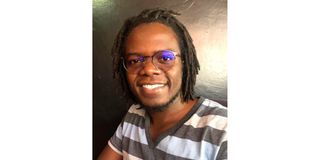The boy child as a key ally in gender equality quest

Kennedy Abott, a sexual and reproductive health rights advocate. He says men have a critical role to play in championing gender equality.
What you need to know:
- In societies where power still resides in the man, changing the narrative is critical.
- The Human Rights Council Working Group on Discrimination against Women and Girls is recommending male involvement in advancing the rights of women and girls.
Male allyship is one of the most overlooked strategies towards achieving gender equality.
In societies where power still resides in the man, Kennedy Abott, a sexual and reproductive health advocate, has been changing the narrative by using his privilege to carry the banner of social change for the last nine years.
“One of the most difficult periods of my life was when my little sister got pregnant at 13 years. As an elder brother, I felt I had failed her and was ashamed of the situation,’’ Mr Abott shared in an interview with the Nation.Africa.
Mr Abott says being born into a polygamous and religious family in Bondo, Siaya County, did not help the situation. “I know what denial, stigma and discrimination feels like because I saw my sister go through it.’
At the time, Mr Abott was 25 and just at the beginning of his advocacy career .Even though he was in the social justice space, he was still in disarray on how to help his sister.
"When I found out about the pregnancy, I did not have the courage to speak about it and did not even want my friends to know that my younger sister was pregnant. However, after spending a year in denial, I knew I had to step up. I could not continue with my advocacy work while things were falling apart at home."
The first step he took was to counsel his sister who had dropped out of high school to nurse her twins.
''That was the first time I had an open conversation with my sister about her situation and the work that I do. I knew the vulnerabilities she would be exposed to if she did not go back to school. I asked her how she felt about going back to school and we agreed that she would return to school in another county."
The difficult part was convincing his father to finance her studies. Since his mother and sister could not directly approach his father, he took up the mantle of persuading his father to take his sister back to school. She eventually went back to high school and took up skills training courses in later years.
The role that Mr Abott played in that rather precarious situation is what the Human Rights Council Working Group on Discrimination against Women and Girls is recommending to advance the rights of women and girls.
Fragile gains
In the council’s position paper on Men’s accountability for gender equality, the group noted that over the past 12 years, there has been fragile gains, slow progress and growing backlash on gender equality movements.
“The engagement of men and boys in achieving gender equality is critical. The notion that men and boys have a role and responsibility, or indeed accountability, for ending gender inequality has a long history in feminist activism, as part of which men have been called upon to support women in ending violence, discrimination and gender injustice,’’ reads the paper.
On the importance of men as allies in the gender equality movement, Mr Abott notes: "So many activists do not practise their activism in their homes.They would rather adopt silent approaches.
"In my case, I could see how scared my mother was in that situation. She also felt that she had failed as a mother and wanted to keep the situation under wraps."
However, due to Mr Abott’s advocacy, he was able to speak about his sister’s pregnancy and prevent further stigma and discrimination. In the Men’s accountability for gender equality paper, the council recommends a number of approaches on how men can be engaged. One of the key strategies is using male agents to transform patriarchal cultural norms.
One of the successful programmes for male agents of change cited by the paper is The Nazareth Centre for Rehabilitation in Bougainville, Papua New Guinea. According to the council, over 900 male advocates have been trained under the programme to support women human rights defenders to lead responses to and prevent violence against women and girls.
Similarly, the Human Rights Council would like countries to engage men such as Abott as advocates to advance gender equality.
“My role in this movement is to give back power to our sisters and mothers so that they can make informed decisions about their lives. I also urge other men to use their power in society to be agents of change. Just use your voice and you could change a woman’s life,’’ Mr Abott says.





